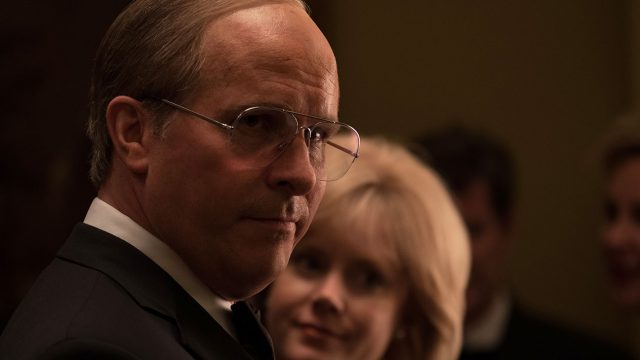Vice: Touch Me, I’m Dick, by David Bax

Some of the best elements of Adam McKay’s caustic, righteous, hilarious The Big Short are the digressions and cutaways used to explain complex, esoteric concepts, like Anthony Bourdain using a restaurant’s leftover fish to demonstrate collateralized debt obligation. In his new film, Vice, McKay utilizes watered down versions of this technique. When, for instance, the narrator (Jesse Plemons) describes Donald Rumsfeld wielding political power like a butterfly knife, we get an illuminating accompanying shot of a man wielding a butterfly knife. Such insulting simplifications are par for the course over every agonizing minute of McKay’s strident, superficial, featherweight new film.
Vice tells the story of the life–or at least the political career–of former Vice President Dick Cheney, from his early 1960s DWI arrests through his time as an aide to Donald Rumsfeld, his serving as Gerald Ford’s chief of staff, his tenure as George H.W. Bush’s Secretary of State, all the way to his eight years as Vice President to George W. Bush.
Making an expansive biopic such as this usually belies a curiosity, sometimes even a sympathy, toward the inner life and motivations of the subject. Vice displays nothing of the sort. There is no real dialogue going on here, not between the film and the viewer and not even between the characters. From Amy Adams’ Lynne Cheney to Sam Rockwell’s George W. Bush to Steve Carell’s Rumsfeld to any of the movie’s many, many other roles, not one of them is a distinct character. Each speaks with the voice of McKay. This film is the opposite of curiosity. McKay is not asking anything, only telling.
In fact, it only takes him a few minutes to sum up how we’re supposed to feel about Cheney. By the time Plemons (whose narrator character is one of the film’s few truly clever conceits, even if the narration itself is thuddingly dumb) calls Cheney a dirtbag, you’ll barely have gotten started on your popcorn. Sometimes such tactics come across as simply straightforward; certainly the long section on the dishonest inception and callous mismanagement of the war in Iraq is effective in reigniting ire about that shameful disaster. But there’s nothing about it that couldn’t have been handled just as effectively in a magazine article.
The only apparent purpose for dramatizing all this is a facile and unprovable one. Nearly every line spoken is dripping with the irony that comes from us knowing how things will turn out, from Fox News to enhanced interrogations to weapons of mass destruction. McKay appears, then, to be arguing that Cheney and his cohorts knew what would happen and either didn’t care or were rooting for it. Evidence for the latter can be found in their cartoonishly evil grins. The true irony is that insisting Cheney is responsible for things the film doesn’t make an argument for (including present day travesties like never-ending wildfires and children forcibly separated from their parents) is exactly the sort of tactic McKay depicts his characters using to convince the public that Saddam Hussein was in need of immediate deposing. So the American people are a bunch of rubes which, I suppose, is why McKay assumed we’d fall for it again here.
Perhaps the most galling thing about Vice is that a movie from the director of Anchorman and Step Brothers is this unfunny. It’s not that it’s a serious drama. No, it actually tries to be funny. In fact, it just won’t stop trying; just when you start to feel a wave of relief that it’s all over, a mid-credits scene raises the bar yet again on painful non-jokes. Maybe McKay has been spending too much time on Twitter. With Vice, he’s fallen prey to that platform’s preference for smug dunks over insight, persuasion or comedy.






























